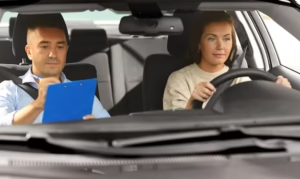
Learning to drive is one of the most empowering milestones in life. It’s not just about getting from point A to point B—it’s about gaining independence, confidence, and freedom. But before you hit the road, the most crucial step is choosing the right driving school and instructor. In 2025, with so many driving schools offering different packages, technologies, and teaching methods, it’s essential to ask the right questions before booking your driving lessons.
Whether you’re a beginner or brushing up on your skills, here’s a detailed guide on the key questions to ask before booking driving lessons in the USA in 2025. Before this, explore Horizon Driving School in Ohio, USA here.
- Is the Driving School Licensed and Accredited?
The first question you should ask is about accreditation. Every state in the USA requires driving schools to be licensed by the Department of Motor Vehicles (DMV) or an equivalent authority. A certified school ensures that instructors are trained, vehicles are insured, and the curriculum follows state laws.
Tip: Ask to see proof of licensing. You can also verify the school’s status on your state DMV website. A legitimate school will always be transparent about its credentials.
- Who Will Be My Instructor, and Are They Certified?
Even if a school is reputable, your learning experience depends heavily on your instructor. Ask if the driving instructor holds a valid teaching license and how many years of experience they have.
In 2025, many instructors also have digital teaching certifications, meaning they use simulators, apps, and smart tools to enhance your training. Don’t hesitate to request an introductory session or meet-and-greet before committing.
Bonus Question: Is the instructor experienced in working with nervous drivers or first-timers? The answer can tell you a lot about their teaching style and patience.
- What Kind of Vehicle Will I Learn In?
Modern driving schools now offer a variety of vehicles—from electric cars to hybrids and traditional gasoline models. Ask what kind of car you’ll be learning in and whether it’s automatic or manual transmission.
Why it matters in 2025: With the increasing adoption of electric vehicles (EVs), some driving schools now offer lessons specifically designed for EV driving—covering topics like regenerative braking and charging station etiquette. Choose a school that matches your long-term driving goals.
- How Are Lessons Structured and What’s the Duration?
Driving lessons aren’t just about time behind the wheel—they’re about structured learning. Ask about:
- How long each session lasts (usually 45 to 60 minutes)
- How many lessons are included in a package
- The ratio of theory to practice
- Whether the school offers simulator training or online modules
A well-structured program ensures steady progress and avoids information overload. If the school offers flexibility to adjust lessons based on your learning speed, that’s a plus.
- What’s Included in the Lesson Package?
Before booking, review exactly what you’re paying for. Some schools offer all-inclusive packages, while others charge extra for certain services.
Ask questions like:
- Does the package include the road test?
- Are pick-up and drop-off services available?
- Is there extra support for learners who need more practice hours?
- Are there hidden fees for rescheduling or cancellations?
Clear communication about pricing prevents unpleasant surprises later.
- What Is the School’s Pass Rate?
The school’s pass rate is a good indicator of its effectiveness. A higher pass rate often reflects better instructors, organized training, and strong preparation for the road test.
However, take this figure with a grain of salt—some schools may exclude repeat students when calculating pass rates. Ask for detailed statistics, if possible, and check online reviews to get a real sense of student satisfaction.
- Do You Offer Refresher or Advanced Lessons?
If you already have a license but haven’t driven for a while, you might prefer a refresher course instead of a full program. Similarly, some schools now offer defensive driving, eco-driving, or EV transition lessons for more advanced skills.
In 2025, driving schools that stay current with technology—like teaching how to use adaptive cruise control or driver-assistance systems—are worth considering.
- Can I Take a Trial Lesson First?
A trial lesson gives you a feel for the instructor’s style, the car, and the overall environment. Many reputable schools offer a discounted or free first lesson to new learners.
This is especially useful if you’re unsure about which school to choose. If the instructor is attentive, encouraging, and communicative during the trial, that’s a great sign.
- What Safety Measures Are in Place?
Safety is non-negotiable. In 2025, driving schools are expected to maintain vehicles equipped with dual controls, airbags, and advanced driver-assistance features.
Ask about:
- Vehicle maintenance schedules
- Insurance coverage during lessons
- COVID-19 or hygiene protocols (some schools still maintain them)
A responsible school should make you feel safe and secure during every session.
- How Flexible Is the Scheduling?
For students, professionals, or parents balancing work and life, flexibility is key. Ask whether you can book lessons online, reschedule easily, or choose evening/weekend slots.
Some modern driving schools even use apps to manage schedules and track lesson progress in real time—giving learners more control over their training journey.
- What Technology and Tools Do You Use?
Driving education in 2025 is more tech-driven than ever. Many schools use AI-assisted simulators, dash-cam feedback, and digital progress reports to make learning more interactive.
Ask if the school provides:
- In-car camera feedback for post-lesson reviews
- Access to online resources or quizzes
- Integration with driving apps for practice tracking
These innovations can significantly improve your learning curve and confidence.
- What Happens If I Fail the Driving Test?
No one likes to think about failing, but it’s better to be prepared. Ask what kind of support the school provides if you don’t pass your first attempt.
Do they offer extra practice hours at a discounted rate? Will they guide you on the areas to improve? A supportive school will help you rebuild confidence and succeed the next time around.
- How Do You Handle Nervous or Anxious Drivers?
Many beginners struggle with fear or anxiety when learning to drive. Ask the instructor how they help students manage this. The best instructors use calm communication, gradual exposure, and stress-reducing techniques to build confidence.
Some schools even offer specialized anxiety-reduction programs or mindfulness sessions before lessons—a 2025 trend that’s making driving education more human-centered.
- Are There Student Reviews or Testimonials I Can Check?
A trustworthy driving school will proudly share reviews or connect you with past students. Online platforms like Google, Yelp, or even TikTok and YouTube now feature driving school reviews and vlogs from real learners.
Look for comments about instructor behavior, lesson structure, and overall satisfaction. If most reviews are positive and consistent, that’s a strong green flag.
- What Makes Your School Different?
Finally, ask what sets the school apart. The answer to this question can tell you a lot about their priorities—whether it’s technology, safety, personalized instruction, or customer experience.
Some schools may highlight eco-friendly vehicles, while others focus on empowering women drivers or offering multilingual instruction. Choose one that aligns with your values and comfort level.
Conclusion: Smart Questions Lead to Smarter Choices
Choosing the right driving school in the USA in 2025 isn’t just about convenience—it’s about quality, safety, and trust. By asking these essential questions, you can ensure your investment leads to a smooth, confident, and successful learning experience.
Remember, your driving journey begins long before you turn the ignition—it starts with making informed decisions. So, take your time, compare options, and choose a school that truly prioritizes your growth as a driver. Once you do, you’ll be well on your way to earning your license—and the freedom that comes with it.






